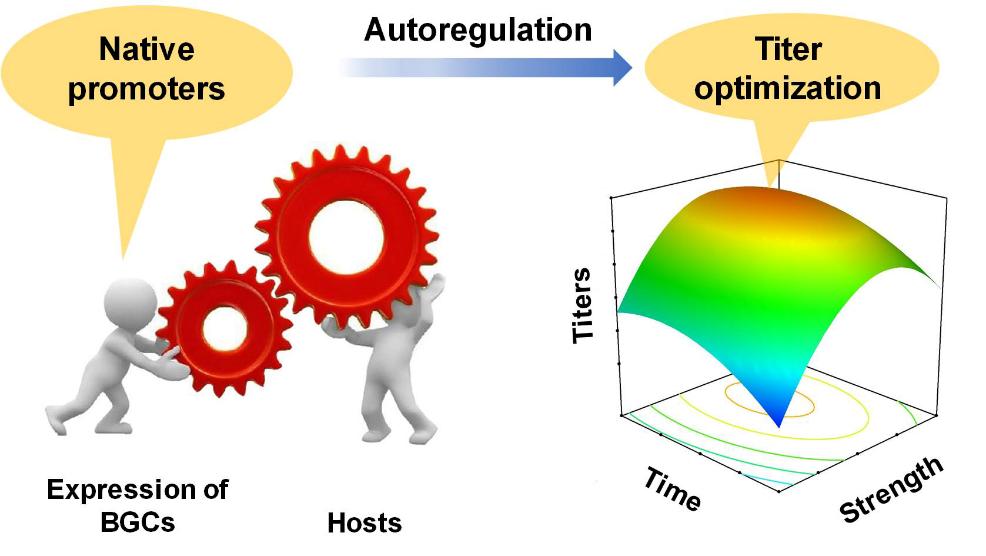Streptomycetes are well-known producers of biologically active secondary metabolites. Various efforts have endeavored to increase productions of these metabolites, while few approaches could well coordinate the biosynthesis of secondary metabolites and other physiological events of their hosts.
Dr. WANG Weishan and his colleagues found that inducible promoters, capable of modulating the expression in both time and strength dimensions, are far superior to constitutive promoters for titer improvement when employed to tune the expression of actinorhodin (Act) and jadomycin biosynthetic gene clusters (BGCs) in Streptomyces coelicolor and Streptomyces venezuelae, respectively.
However, the use of exogenous inducers will increase the cost in scaled-up fermentations. To address this issue, here we develop a universal autoregulated strategy for optimizing the production of secondary metabolites in Streptomyces species.
First, inducible promoters were used to control the expression of secondary metabolites BGCs. Then, the optimal induction condition was determined by response surface model in both dimensions of time and strength. Finally, native promoters with similar transcription profile to the inducible promoter under the optimal condition were identified based on time-course transcriptome analyses, and used to replace the inducible promoter following an elaborate replacement approach. This strategy was applied for optimizing the expression of Act and heterogeneous oxytetracycline (OTC) BGCs in Streptomyces coelicolor.
Compared to modulating the expression via constitutive promoters, their strategy could dramatically improve the titers of Act and OTC by 1.3- and 9.1-fold, respectively. The autoregulated fine-tuning strategy developed here opens a novel route for titer improvement of desired secondary metabolites in Streptomyces.
This work was supported by grants from National Natural Science Foundation of China (31570031, 31400034); Ministry of Science and Technology of China (2013CB734001); Youth Innovation Promotion Association (2016087); The International Partnership Program of Chinses Academy of Science (153211KYSB20170014).

Figure Schematic illustration of the autoregulated fine-tuning strategy
(Image from Dr. WANG Weishan)
Contact:
Dr. WANG Weishan
State Key Laboratory of Microbial Resources, Institute of Microbiology, Chinese Academy of Sciences, No.1 West Beichen Road, Chaoyang District, Beijing 100101
E-mail: wangws@im.ac.cn
Keywords: Streptomyces; Autoregulation; Biosynthetic gene cluster
Link:
1. Wang et al., Appl Environ Microbiol. 2013, 79(14):4484-92;
http://aem.asm.org/content/79/14/4484.full.pdf;
2. Li et al., Microb Cell Fact. 2015,14(1):172.
http://www.ncbi.nlm.nih.gov/pmc/articles/PMC4625935/pdf/12934_2015_Article_351.pdf
3. Wang et al., ACS Synth Biol. 2016,5(7):765-73.
http://www.ncbi.nlm.nih.gov/pubmed/27100123
4. Li et al., ACS Synth Biol. 2017 (doi: 10.1021/acssynbio.7b00318).
https://www.ncbi.nlm.nih.gov/pubmed/29087698
